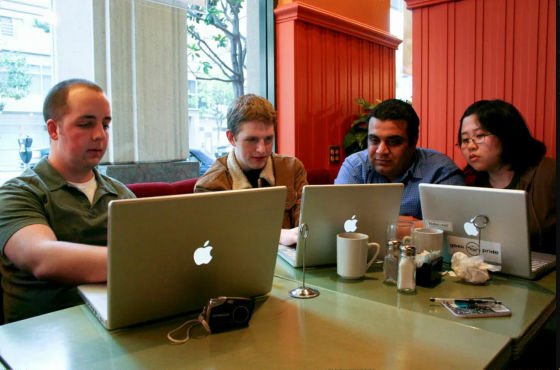What kind of person is WordPress founder Matt Mullenweg, who believed that 'open source is the future of the Internet' and created a company of 860 billion yen from 19 years old to 18 years?

Matt Mullenweg, WordPress are building a more open internet --Protocol — The people, power and politics of tech
https://www.protocol.com/matt-mullenweg
In January 2003, Marenwegg, a 19-year-old college student, learned that the blog software 'b2 / cafelog' he had been using had been abandoned by the developers, so he wanted to maintain his blog. I decided to fork / cafelog. After that, Marenwegg, who worked with his friend Mike Lyttle, said, ' If you make b2 / cafelog a General Public License , anyone can fork or change the code, so it will not be robbed. I can think of it. And on May 27th of the same year, the forked b2 / cafelog was released under the name 'WordPress'.
Marenwegg, a college student, shared his WordPress ideas in many places. People who remember those days talk about Marenwegg as 'looking like a child,' 'feeling good,' and 'having a surprisingly big idea.' Blogger and venture capitalist Homme Malik, who is an old friend of Marenwegg, said about the time, 'I'm just starting out with WordPress and every time I run into a problem I send a long email to Matt to help. Matt and I became friends. We talked about the internet and the open internet, but we didn't talk about business. '
The following pictures were taken in 2005. The second person from the left is Mr. Marenwegg.

Mr. Marenwegg wants to spend most of his life on WordPress, so after graduating from college, he will start working at CNET, a web media that offered to 'pay for WordPress development.' While working, Mr. Marenwegg said that he wanted to spend more time on WordPress, but many startups wanted to work for decades at a company that works on open source projects if they want to create a company. I avoided the method of 'getting an investment from a venture capitalist' like this.
In 2005, Marenwegg left CNET. And Marenwegg will launch Automattic with former Yahoo! executive Toni Schneider as CEO. When Schneider first spoke to Marenwegg, he said he didn't take it seriously as 'what a 21-year-old child says.' However, as he proceeded, Schneider realized that Marenwegg was betting his life on WordPress and was interested in the fact that 'WordPress is a tool to make a better Internet', so he started the company. It seems that he decided to be involved in.
Eighteen years after Marenwegg first embarked on WordPress, Automattic has grown into a large company worth $ 7.5 billion. However, even if the scale is expanded, Mr. Marenwegg had at the time of its founding, 'All software should be available and editable by anyone', 'If the community works together, we can make wonderful things' 'Being surrounded by walls' The idea that 'the garden will eventually collapse' remains unchanged. On the other hand, Facebook expanded in the opposite direction to Mr. Marenwegg. In 2021, when Facebook was founded 17 years ago, the company is hitting a big wall, including alleged antitrust violations.

In 2014, Marenwegg replaced Schneider as CEO of Automattic. In recent years, Automattic has acquired more and more companies, with a tendency to 'build and buy open alternatives every time another company builds a closed system.' You can see it. For example, Automattic acquired Tumblr following Facebook's increased scrutiny. Automattic acquired PocketCast as Spotify gained more control over the audio and podcast ecosystem.
'Alternatives that focus on'creators', not advertisers, are very important. As part of this idea, we also need alternatives for our advertising business model.' Mr. Maren Wegg. Mozilla, which develops Firefox, and Brave, a privacy-focused browser, are moving away from the current Internet of advertising revenue and proposing new revenue models , and Marenwegg agrees with these ideas.
Also, Mr. Marenwegg is not an aggressive type, but he seems to be quite strict against companies that trample the spirit of open software and open systems. I posted an angry blog article when Wix, a homepage creation tool, carried out an advertising campaign 'Once you enter it like a cockroach, you can never exit it again'. Anil Dash, CEO of software company Glitch, which ran the blog service Six Apart, said Marenwegg took advantage of all Six Apart's failures to expand WordPress. I'm not resentful because I've just taken the right strategy at the right time, but I wish he had turned that energy towards Mr. Zuckerberg. '
While WordPress and Facebook are heading in the opposite direction, Marenwegg hasn't shouted out Facebook's problems or run anti-campaigns. Google also faces similar issues with Facebook when it comes to data collection, but hasn't criticized Google. On the other hand, Automattic is continuing to prepare to create and promote open alternatives to take over the products of these companies.

Mr. Pierce, who interviewed, wrote that Mr. Marenwegg tends to have a very big perspective. For example, when Pierce asks about Instagram and the iPhone, Marenwegg
'I don't think we need to limit ourselves to technology. Take a step back and look at the history of mankind, the current world situation, and how the pendulum of liberalism and authoritarianism works. The two go back and forth, and it's unlikely that a company will suddenly stop pendulum, 'Mallenwegg said. Such 'pendulums' also exist in the world of the Internet, and what was built as open source may be dominated by a small number of dictators, but ultimately monopoly by those seeking 'freedom'. Mr. Marenwegg thinks that it will end. In fact, this phenomenon is also reflected in Tesla's open source of electric vehicle patents and the emergence of Web3, centered on the decentralized blockchain community.
At present, giant tech companies such as Google and Facebook have a 'minority monopoly'. To change Google and Facebook, it is necessary to change the 'advertising-based business model' of the Internet itself, but the privacy and content moderation issues related to this are very complicated, and it is quite difficult to solve the problem. Marenwegg sees that it will take some time.

But Marenwegg isn't in a hurry, and Automattic is growing steadily as many companies face antitrust barriers. Marenwegg says he wants to 'create Berkshire Hathaway on the Internet,' which owns products and services that are important and ambitious in technology and are in the future of open source software. Marenwegg, whose goal is to use WordPress for 85% to 90% of websites in the future, says, 'To be a true platform, you have to be open, or it's a trap. It's like, 'he said, indicating his intention to penetrate the service in a different way from Amazon and Facebook, which dominate the Internet in 2021.
Related Posts:
in Web Service, Posted by darkhorse_log







